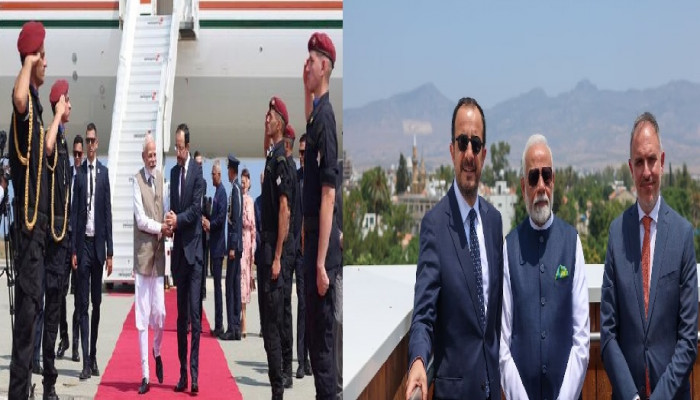India- Cyprus Bonhomie: A Strategic Mediterranean Reset
- In Foreign Policy
- 06:11 PM, Jun 18, 2025
- Ramaharitha Pusarla
The rising global stature of a country must be reflected in its confident diplomatic outreach. An unambiguous foreign policy and assertive geopolitical signalling can forewarn the hostile actors of the red lines. The 88-hour-long Operation Sindoor has been a watershed moment for India regarding counter-terrorism and strategic doctrine. The lessons from the operation provided a strategic clarity, prodding India to offset the strategic encirclement of the Pakistan-Turkey axis. PM Modi’s Cyprus visit is an important strategic signal in itself.
On his first leg of the three-nation visit, PM Modi landed at Nicosia on June 15th. This marks the third visit by an Indian Prime Minister to the island, the first being Indira Gandhi’s visit in 1983. Atal Bihari Vajpayee travelled to Cyprus in 2002.
Reimagining and reshaping Turkey as a 21st-century Caliphate, Erdogan has been aiding radical Islamic entities like Hezbollah, Hamas and Hayat Tahrir al-Sham (HTS). Backing Pakistan perfectly aligned with his ideological agenda. Turkey’s strong support to Pakistan during Operation Sindoor, both militarily and diplomatically and Erdogan’s reckless needling of India with references to the Kashmir issue at international platforms have confirmed Ankara’s hostility towards India. Recent reports of Turkish intelligence agencies financially backing Bangladesh’s Jamaat-e-Islami have underscored Turkey’s animosity.
Aware of Turkey’s muscular strategic moves aimed at India, New Delhi has been swiftly tightening ties with its regional neighbours- Armenia, Egypt and Greece. PM Modi’s Cyprus visit is part of India’s strategic messaging to Turkey.
Countering muscular moves with studied diplomacy, India has been swiftly tightening defence cooperation with Turkey’s rivals in the region—Armenia, Egypt, Greece, and now Cyprus. PM Modi’s first overseas destination to Cyprus post-Operation Sindoor is a deft signal to Turkey.
India and Cyprus relations, anchored in anti-colonial struggles and the Non-Aligned Movement, had cordial links rooted in trust. Cyprus supported India during the 1962 Chinese aggression, while India rushed humanitarian supplies as the country battled through conflicts between Greek Cypriots and Turkish Cypriots in 1964. Ever since, India has been part of the UN Peacekeeping Force in Cyprus (UNFICYP) and has been a dependable partner of Cyprus.
India has flourishing trade with Cyprus, valued at $137 million (2023-24). Cyprus is among the top 10 sources of investment for India, with cumulative investments of $15 billion. The advanced financial sector services of the island and the revision of the Double Taxation Avoidance Agreement (DTAA) in 2016 had created a favourable investment climate.
Getting ready to assume the presidency of the EU Council in early 2026, Cyprus can play a great role in the India-EU FTA and strategic partnership. India and the EU are at the cusp of finalising the FTA, and strong relations with Cyprus can help New Delhi secure the economic engagement. In February, Euro Bank of Cyprus opened a representative branch in Mumbai, serving as a gateway for Indian businesses in Cyprus.
Straddling Asia, Europe and Africa, Cyprus occupies a geographic sweet spot, making it an ideal logistical hub. Cyprus is the entry point for the India-Middle East-Europe Economic Connectivity (IMEC) trade route. India is actively exploring the prospect of increasing shipping presence on the island.
In a warm gesture, Cyprus President Nikos Christodoulides received PM Modi at the airport. Leaders addressed the Cyprus–India Business Round Table on Advancing a Strategic Economic Partnership at Limassol and welcomed the signing of two MoUs, including plans to launch UPI for cross border payments and cooperation between GIFT City and Cyprus Stock Exchange.
Extending a ceremonial welcome to PM Modi at the Presidential Palace, leaders held bilateral talks on bilateral, regional and global issues. Leaders “expressed concern” over the Israel-Iran war and conflicts in Asia and Europe, and they agreed that “this is not an era of war”. Both leaders strongly condemned terrorism and violent extremism. Calling for expeditious finalisation and adoption of the Comprehensive Convention on International Terrorism (CCIT) within the UN framework, Cyprus strongly condemned the Pahalgam attack.
India reaffirmed its unwavering support for the “independence, sovereignty, territorial integrity, and unity of the Republic of Cyprus”. Cyprus was partitioned following Turkey’s invasion in 1974. Turkey invaded Cyprus in response to a Greek junta military coup’s attempt to annexe the island. Since the attack, Turkey has evicted Greek Cypriots, continued to occupy 37% of the north eastern region of the island. Even after the Greek Cypriot majority formed a legitimate, internationally recognised Republic of Cyprus, Turkey refused to withdraw its military troops from Northern Cyprus.
Soon, Turkish Cypriots migrated to the region, established their claims and declared independence in 1983. They assumed the name of the Turkish Republic of North Cyprus (TRNC). Pakistan and Bangladesh recognised the TRNC just days after its independence. Following UNSC resolution 541, which declared North’s independence “legally invalid”, both countries revoked their recognition. Pakistan was the lone country to have voted in favour of the resolution. TNRC is currently recognised by Turkey, with whom it exchanges diplomats.
On his visit to Turkey post-Pahalgam attack, Pakistan Prime Minister Shahbaz Sharif announced his support for TRNC. TRNC continues to occupy a high place in Turkey’s agenda, which Pakistan unfailing continues to support.
India’s ties with Cyprus were never transactional. Indian Military legends like Lt. Gen. P.S. Gyani, Lt. Gen. Dewan Prem Chand and Gen. K.S. Thimayya have UN peacekeeping missions on the island. Cyprus indeed named a street after Thimayya, who died in 1965 while serving (UNFICYP) and issued a commemorative stamp in his memory in 1966. India’s support to Cyprus has been legendary.
As deft message to Turkey from the Cyprus Buffer Zone/ Green Line, amid foreboding hostilities, PM Modi with President Christodoulides by his side, strongly pitched for the reunification of Cyprus. The Joint Statement also stated, “Cyprus and India expressed their strong commitment to the resumption of UN-facilitated efforts to achieve a comprehensive and lasting settlement of the Cyprus Question on the basis of a bizonal, bicommunal federation with political equality, in accordance with the agreed UN framework and the relevant United Nations Security Council Resolutions”.
After the discovery of gas deposits in the Levant basin of the Eastern Mediterranean region - Greece, Israel, and Cyprus sealed a deal in January 2020 to build a 1900 km undersea EastMed Pipeline to transport gas to Europe. The EastMed project would eventually make Cyprus, Greece and Israel the key links to Europe’s energy supply, reducing reliance on Azerbaijan’s Trans-Anatolian Natural Gas Pipeline (TANAP) passing through Turkey. Perceiving this as a slight to its importance as a regional energy hub, Turkey stymied the EastMedline by inking a maritime deal with Libya to delineate the continental shelves in the Mediterranean Sea. This maritime map overlapped the Exclusive Economic Zones (EEZs) of Cyprus and Greece. Challenging Cyprus's claims over the EEZ, Turkey threw a spanner into the EastMed project, leading to its collapse.
Raking up historical disputes with Greece and Cyprus over the Aegean Islands and the TRNC, Turkey established naval bases in Northern Cyprus. Turkey’s aggressive military posturing led to the commencement of the annual edition of joint military exercises involving France, the UAE, Italy, Cyprus and Greece in the Eastern Mediterranean. Cyprus is rich in energy reserves. This augurs well with India’s attempts to diversify energy imports and plausible energy cooperation.
Given the threat from revisionist Turkey, India, Greece and the UAE have established a trilateral dialogue. During the current visit, PM Modi launched India–Greece–Cyprus (IGC) Business and Investment Council to foster trilateral cooperation in shipping, logistics, renewable energy, civil aviation and digital services.
Marking 60 years of diplomatic ties, India and Cyprus signed an MoU on defence cooperation in December 2022. To enhance structured and defence and military exchanges and cooperation, both countries signed the Bilateral Cooperation Development Programme (BCDP) in January 2025.
Strongly aligned in their commitment to ocean governance, countries are now exploring opportunities for increased port calls, joint maritime training and maritime domain awareness. Leaders have also agreed to institutionalise coordination in evacuation, Search and Rescue (SAR) operations. To firm up ties and lay the foundation for an enduring partnership, leaders have tasked their respective Ministry of Foreign Affairs to prepare an Action Plan for the next five years, 2025-29.
Cyprus firmly supports India’s position on the Kashmir issue and New Delhi’s inclusion in the Nuclear Suppliers Group (NSG) and the International Atomic Energy Agency (IAEA) and the expanded UNSC as a permanent member.
President Christodoulides conferred on PM Modi the Grand Cross of the Order of Makarios III, the highest honour bestowed by Cyprus on foreign heads of government. In a show of deep friendship, both leaders walked together in the historic centre of the capital city, Nicosia, and on the Mediterranean shore. As India seeks to recalibrate its ties with the Mediterranean and Europe, Cyprus' status as an EU member can be strategically very important.
Meticulously aligning strategic vision with national interests, PM Modi’s foreign policy doctrine has been dextrously suffused with symbolism and unambiguous strategic signalling. Rooted in trust, mutual respect, and cementing mutually beneficial partnerships, PM Modi has been consistently positioning India as a responsible power. Treating every nation as an equal partner regardless of the power calculus, India is rewriting the revisionist and hegemonistic order of geopolitical rise.
Disclaimer: The opinions expressed within this article are the personal opinions of the author. MyIndMakers is not responsible for the accuracy, completeness, suitability, or validity of any information on this article. All information is provided on an as-is basis. The information, facts or opinions appearing in the article do not reflect the views of MyindMakers and it does not assume any responsibility or liability for the same.







Comments